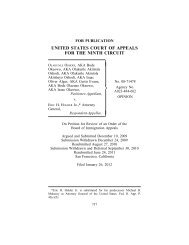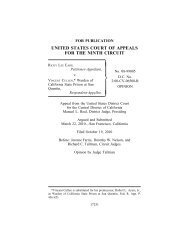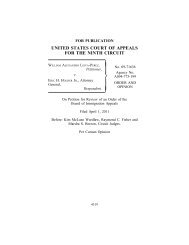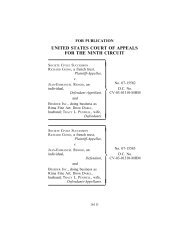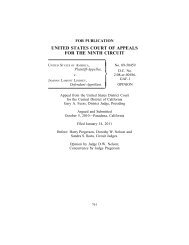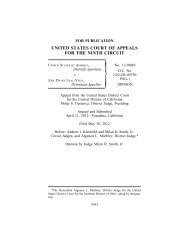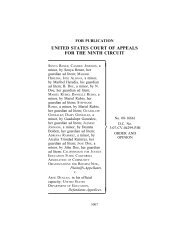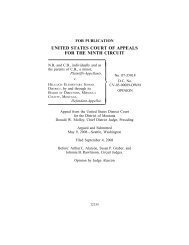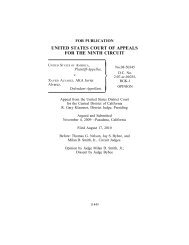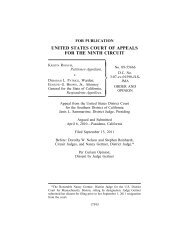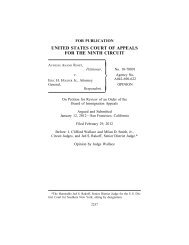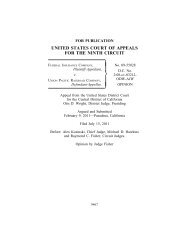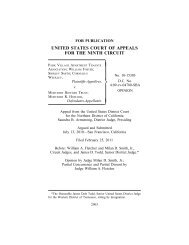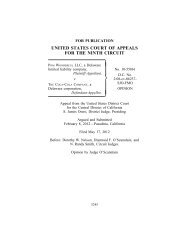UNITED STATES COURT OF APPEALS FOR THE NINTH CIRCUIT
UNITED STATES COURT OF APPEALS FOR THE NINTH CIRCUIT
UNITED STATES COURT OF APPEALS FOR THE NINTH CIRCUIT
Create successful ePaper yourself
Turn your PDF publications into a flip-book with our unique Google optimized e-Paper software.
9780 PAYNE v. PENINSULA SCHOOL DISTRICT<br />
etary damages does not automatically excuse the IDEA’s<br />
exhaustion requirement. Id.; see also Frazier v. Fairhaven<br />
Sch. Comm., 276 F.3d 52, 64 (1st Cir. 2002); Covington v.<br />
Knox County Sch. Sys., 205 F.3d 912, 916 (6th Cir. 2000);<br />
Padilla v. Sch. Dist. No. 1 in the City and County of Denver,<br />
Colo., 233 F.3d 1268, 1274 (10th Cir. 2000); Charlie F. v. Bd.<br />
of Educ. of Skokie Sch. Dist. 68, 98 F.3d 989, 993 (7th Cir.<br />
1996); N.B. v. Alachua County Sch. Bd., 84 F.3d 1376, 1379<br />
(11th Cir. 1996). Thus—because a plaintiff who includes an<br />
education-related prayer for monetary damages necessarily<br />
does not “actually” seek relief available under the IDEA—we,<br />
and our sister circuits, have held that what “matters” for<br />
exhaustion purposes is precisely whether a plaintiff “could<br />
have” sought relief for the claimed injuries, which relief is<br />
also available under the IDEA through in-kind services. The<br />
majority opinion does not overturn this aspect of our IDEA jurisprudence;<br />
7 this leaves us with a puzzling inconsistency. On<br />
the one hand, as the majority holds today, the phrase “seeking<br />
relief” requires courts to look solely at what form of relief the<br />
plaintiff “actually sought.” On the other hand, courts will look<br />
necessarily to what sort of relief a plaintiff “could have”<br />
sought in complaints which seek damages measured in the<br />
cost of services available in-kind under the IDEA, or which<br />
seek monetary damages for claims which are explicitly based<br />
upon alleged violations of a plaintiff’s substantive IDEA rights, 8<br />
Maj. Op. at 9751-52, 9754-55.<br />
7 The majority holds that a plaintiff’s prayer for monetary damages does<br />
not automatically excuse the IDEA’s exhaustion requirement. For example,<br />
if “the measure of a plaintiff’s [monetary] damages is the cost of<br />
counseling, tutoring, or private schooling — relief available under the<br />
IDEA — then the IDEA requires exhaustion.” Maj. Op. at 9754. The<br />
majority holds the exhaustion requirement also applies if a plaintiff “seeks<br />
damages to fund a private education (without mentioning the IDEA).” Id.<br />
Because such claims explicitly seek the “functional equivalent” of an<br />
IDEA remedy, the majority holds relief is “also available” under the<br />
IDEA. I agree the exhaustion requirement applies in such cases; I do not,<br />
however, read § 1415(l) so narrowly.<br />
8 Consider, for example, one situation in which the majority holds that<br />
“exhaustion is clearly required”: where a plaintiff files a claim for dam-



